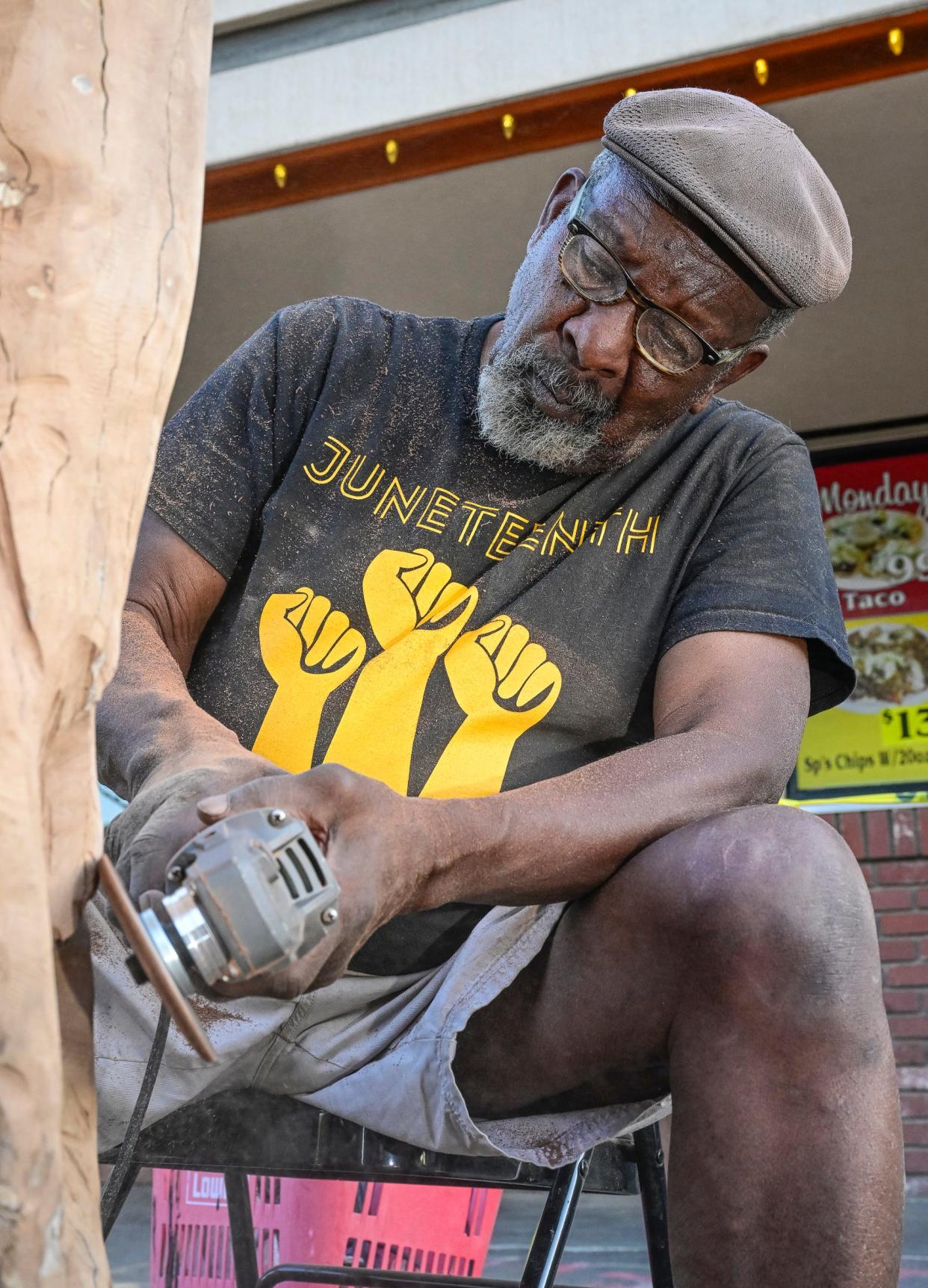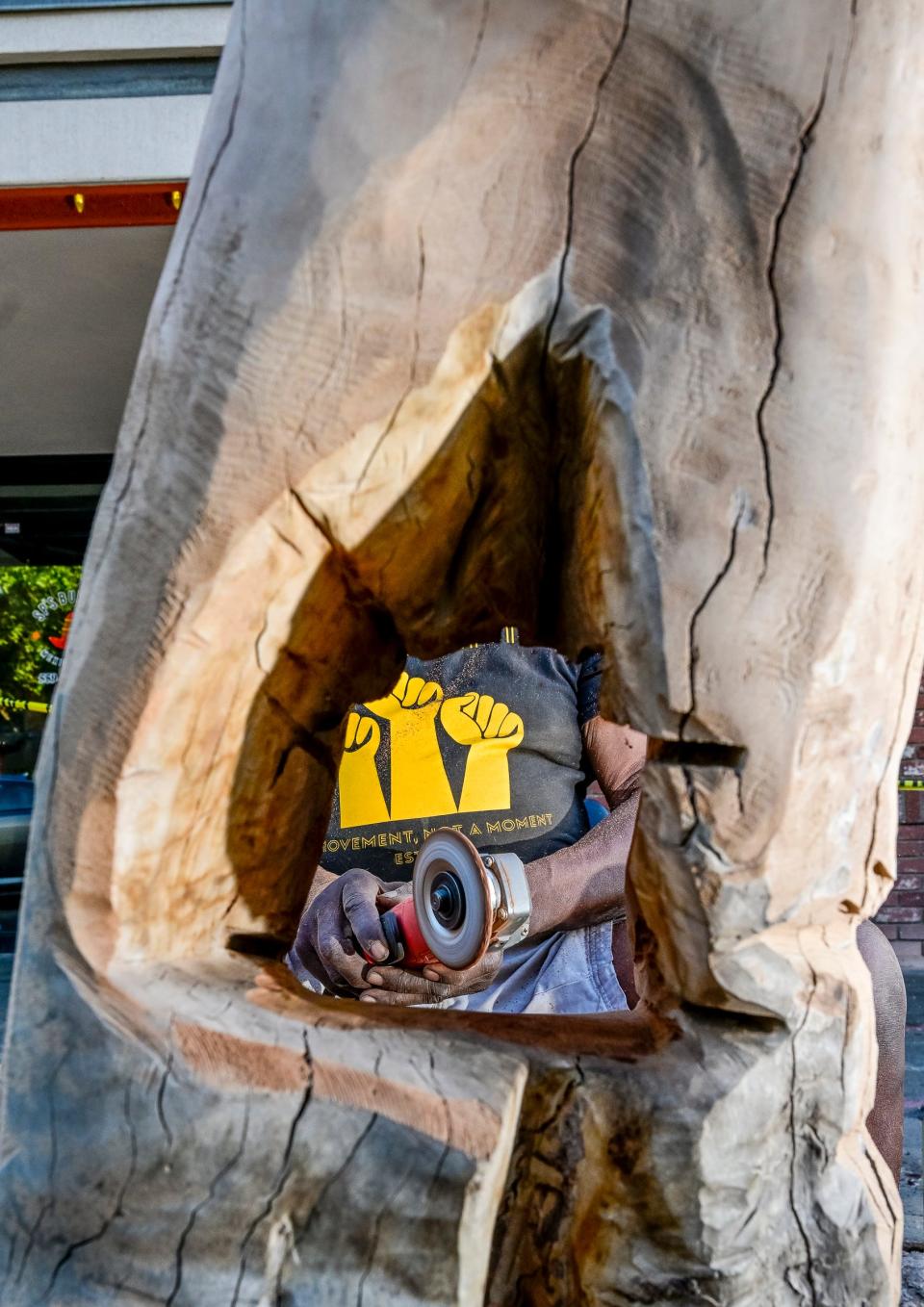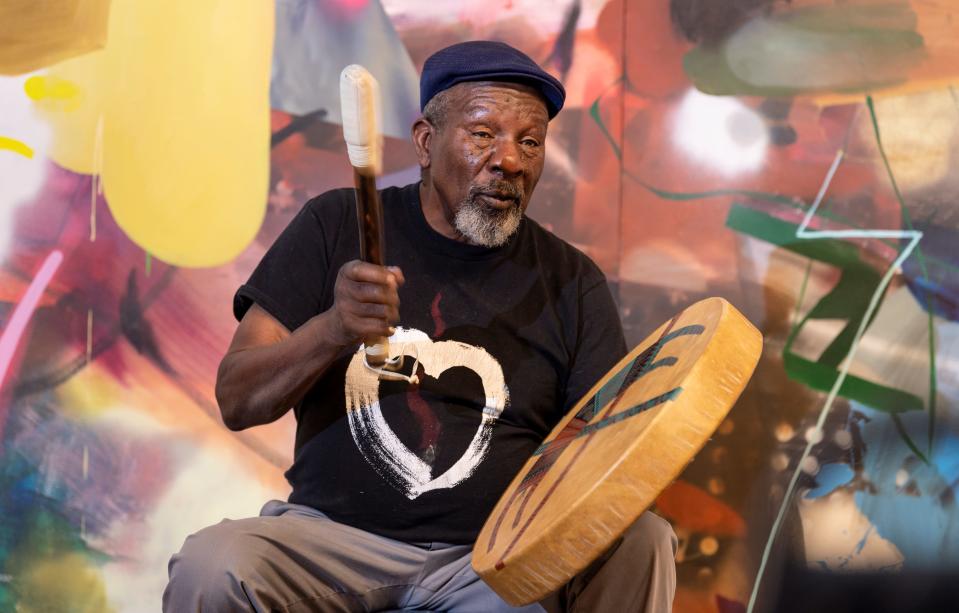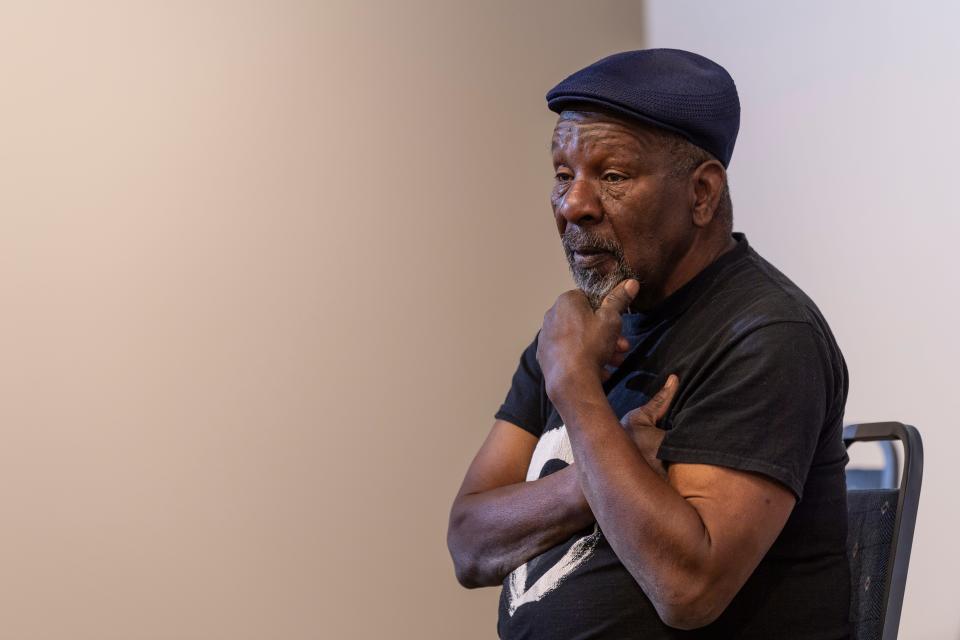Artist, activist Buddy Jones to be presented Marjorie Brandon Award for his community work

- Oops!Something went wrong.Please try again later.
- Oops!Something went wrong.Please try again later.
- Oops!Something went wrong.Please try again later.
Buddy Jones is a Renaissance man. He does wood sculpting, he drums, he’s built roads, done rock reconstruction, taught at Synanon, worked for civil rights, met famous people and is dedicated to cultural diversity and community activism.
He will be presented with the Marjorie Brandon Award on Nov. 5. This is the first year Marjorie won’t be at the celebration. A well-known local artist, she died in August, just a month short of her 110th birthday. The award is given in her name each year to a long-time local artist who also goes beyond the scope of his or her art to benefit the community.
Buddy Jones fits the bill. Plus, he’s a gentle giant.
But he wasn’t always that way.
When he was playing football at San Diego State for the soon-to-become-renowned NFL coach John Madden, Madden told him, “Jones, you got to stop hurting people.”
He didn’t mean his teammates, but white people.
“I was mad and hostile, so I hit white folks,” he said.
Poor and black
Raised poor and black in the ghetto east of L.A., Buddy was the middle of nine children. His father, Buster, was a garbage collector with a third-grade education. But he was a self-taught, intuitive master mechanic. Eventually, he quit his garbage-collecting job and opened Buster’s Auto Shop, where he earned a reputation as the best mechanic in Riverside.
Next door to the shop was a Muslim temple where Buddy met Malcolm X. One day Mohamed Ali visited.

Buddy’s mother, Geraldine, presided over a home (a “three-room shack,” Buddy recalled) in which profanity was forbidden; good manners were enforced. The whole family sat down for dinner daily, some perched on boxes because there weren't enough chairs to go around.
"We never thought of ourselves as poor,” Buddy said. “We just didn’t have much money.”
When he got to school, Buddy was marked as “slow.” Nobody knew about dyslexia then. Luckily, he had charm and was a natural leader (in high school, he was informally named Most Popular Student) and an exceptional athlete.
Civil rights
The civil rights movement was beginning, and while in high school, Buddy attended the first civil rights conference on the West Coast. It was held at Asilomar, and the keynote speaker was Martin Luther King, Jr.
"I had learned to play the drums to a certain degree, and a girl guitar player asked me to play with her,” Buddy said.
Afterward, Martin and Coretta Scott King asked Buddy and the guitar player — who turned out to be Joan Baez — to sit at their table.
Several years later, Baez’ manager called to ask Buddy to do a few gigs with her, but he turned her down. It was football season.
Another few years went by, and Buddy attended a writers’ workshop with Bob Dylan and Baez. She remembered him. “I didn’t know you were such a jock,” she told him.
College and football
Although teachers told him not to think about college, he went to junior college and got football scholarships to play at San Jose State and San Diego State.
While in college, Buddy married Shirley Keller, now an artist in Three Rivers. They had two bi-racial boys, but no one would provide housing for them.
The coaches helped the young family find housing and get jobs as house parents in a live-in facility for juvenile delinquents. Buddy’s size and physique helped keep discipline.
“The mystique of being a football player helped,” Buddy laughed.
Later, the family used a new fair housing act to force a landlord to rent them a home.
It was hard for an interracial family to feel safe. Even their young half-black son had a negative perception of African Americans. Drugs and violence were becoming more prominent.
The Jones learned about a new establishment called Synanon, where all ethnicities were welcome. It was the first major drug rehabilitation program in the United States that used a controversial but effective tough-love approach.
Buddy was one of the only black “squares” (non-drug users). There, he learned to play “The Game.” In The Game, everyone talked about their insecurities and trauma while others verbally attacked them, attempting to tear down their vulnerability.
“It was cathartic. I realized I didn’t feel angry anymore.”
Buddy served as a role model, taught school, built roads and served in many capacities during his 19 years there.
But the program was beginning to deteriorate, and Buddy and his new wife, Lori, moved to Lemon Cove and started a construction business.

$30 million business
The business started small, but Buddy Jones Contracting became one of the biggest and most visible black-owned businesses doing major construction projects in Sequoia, Kings Canyon and Yosemite national parks over the next decade. Between 1994 and 2003, the company grew from two to 65 employees and grossed over $30 million.
“The jobs I’m proudest of are the restoration of the Giant Forest and additions to Wuksachi Village, one of the main visitor hubs in Sequoia,” Buddy said.
After finishing those jobs in Sequoia National Park in 2001, Buddy met President George Bush when he came to reopen the park. When they shook hands, the president complimented Buddy on his work.
Buddy said to him, “I hope you’ll keep your promise to continue putting money into the park.”
The president replied, “Well if I don’t, you can fire me.”
Art & drumming
Buddy began drumming at an early age, but when he met expert local drummer Keio Ogama and her husband, master drummer Wadaba Kourouma from Guinea, West Africa, Keio told him, Buddy, you have good rhythm, but you’re all over the place.
“I became educated about drums. Everything you do means something,” he said.
Buddy now leads a drumming circle at the Heritage Cultural Foundation. He has held drumming circles at the Center for Spiritual Living, ImagineU Children’s Museum and wherever he’s invited.

He has always been into wood and building things. He began carving on wood that he found at Synanon, where people did all kinds of art. His backyard is full of his creations. He’ll find a piece of wood and “read” it to see how it should be carved.
He has retrieved wood from old packing houses and a cotton mill and used the wood for his front porch and art projects.
His most recent project is sculpting an old tree stump at the southeast corner of Main and Church in Visalia, which will become a permanent public art piece.
And he is part of “We Art,” a multicultural show set for May at Arts Visalia.
Community activist
Buddy has always been involved in the community. He helped start the Tulare County Association of African American Women, the Positive Black Man Association, and the Fresno Black Chamber of Commerce.
He volunteered at the Whitman Center for years, built the half-circle drive, and did landscaping at Grandma’s House in Tulare.
He built an entire Amtrack train landing in Allensworth when the community was going to hold a big Juneteenth event. Trains still stop there on special occasions.

Buddy Jones & Friends is a community organization devoted to cultural diversity and community activism. Many of Buddy’s activities come under that heading. The group sends rice to Africa. Buddy also takes groups to Allensworth and Sequoia National Park, introducing people of color to places they often have never seen.
Now he is very involved in TOTA, a storytelling website connecting people through culture. www.TOTA.world has more than 4,000 stories about people from different cultures, collecting them before they are lost. There are a number of stories about Buddy.
There’s more
This story is already too long, but the list of Buddy’s accomplishments continues: His suggestion helped integrate the dorms at San Diego State. He helped start the first black student union there. He was a rock climber in the High Sierras. He was part of the Lemon Cove Volunteer Fire Department. He was praised as a hero when he rescued a neighbor boy from a fire. His contracting business was nominated for Small Business of the Year by the California Black Chamber of Commerce.
He’s met other famous people, such as boxer Archie Moore, claimed actors Ozzie Davis and his wife, Ruby Dee, and Cesar Chavez, as friends.
Buddy still shakes his head when he says, “It’s hard to believe. From all the disadvantages of the ghetto to a $30 million business. Who would have thought it possible?”
How to attend
Marjorie Brandon Award & Concert: Honoring Buddy Jones 7 p.m. on Saturday, Nov. 5 Center for Spiritual Living, 117 S. Locust, Visalia Music by Deanna Saldana & Bruce Huddleston Dessert auction Seating in the center is limited. Before the awards, the Roots Jamaican food truck will be set up behind the center from 5:30-6:45 p.m. for those who want to buy dinner. Tickets are $25 on Eventbrite or by calling 559 625-2441.
This article originally appeared on Visalia Times-Delta: Artist, activist Buddy Jones wins Marjorie Brandon Award

